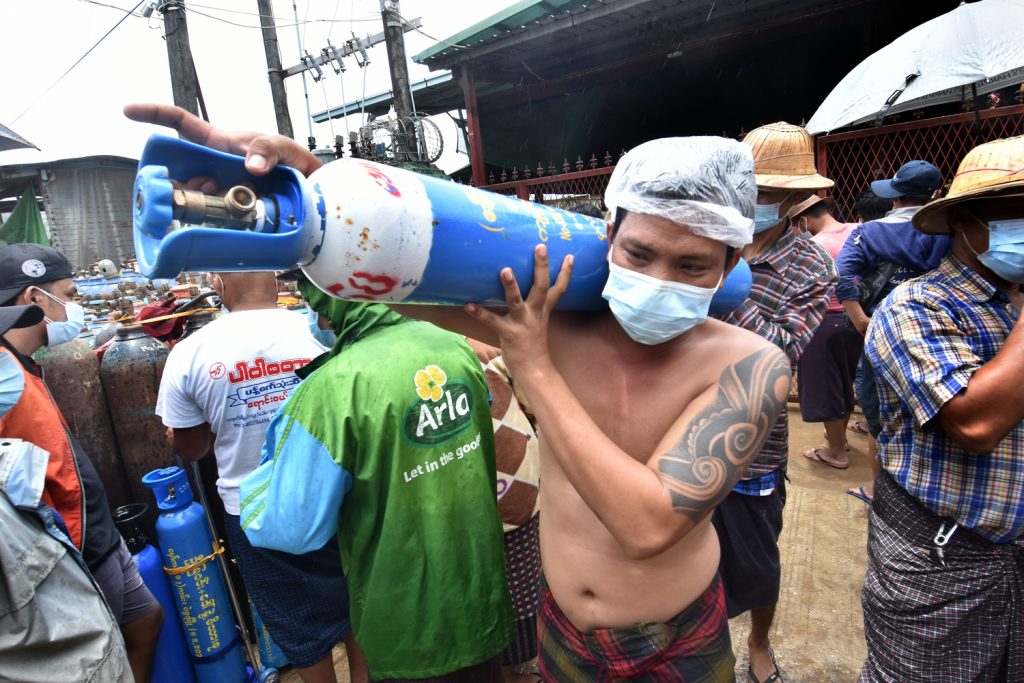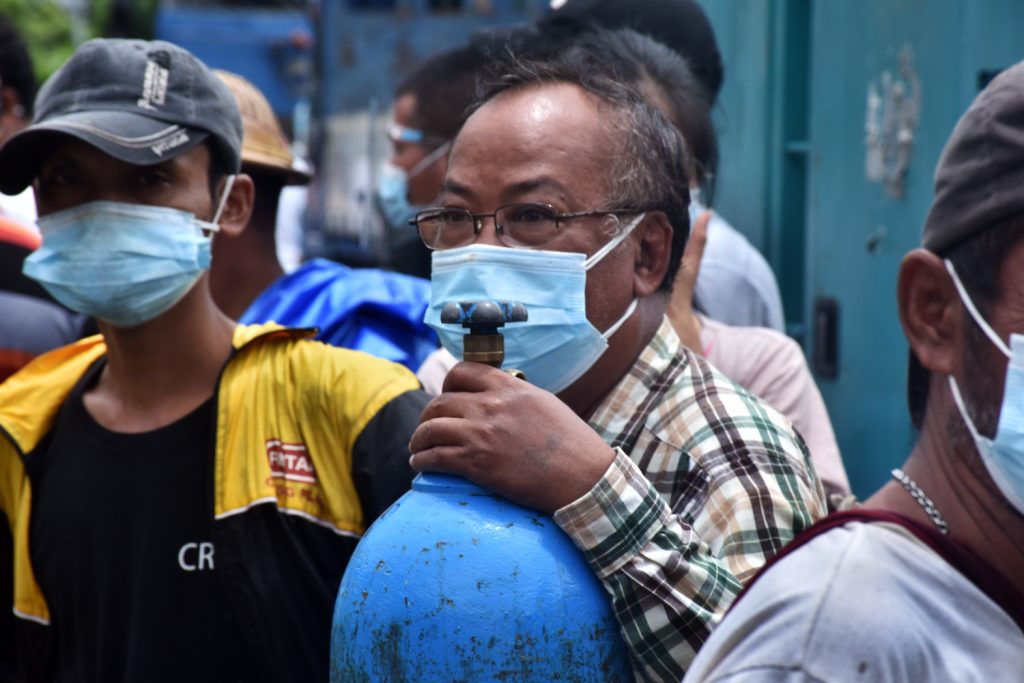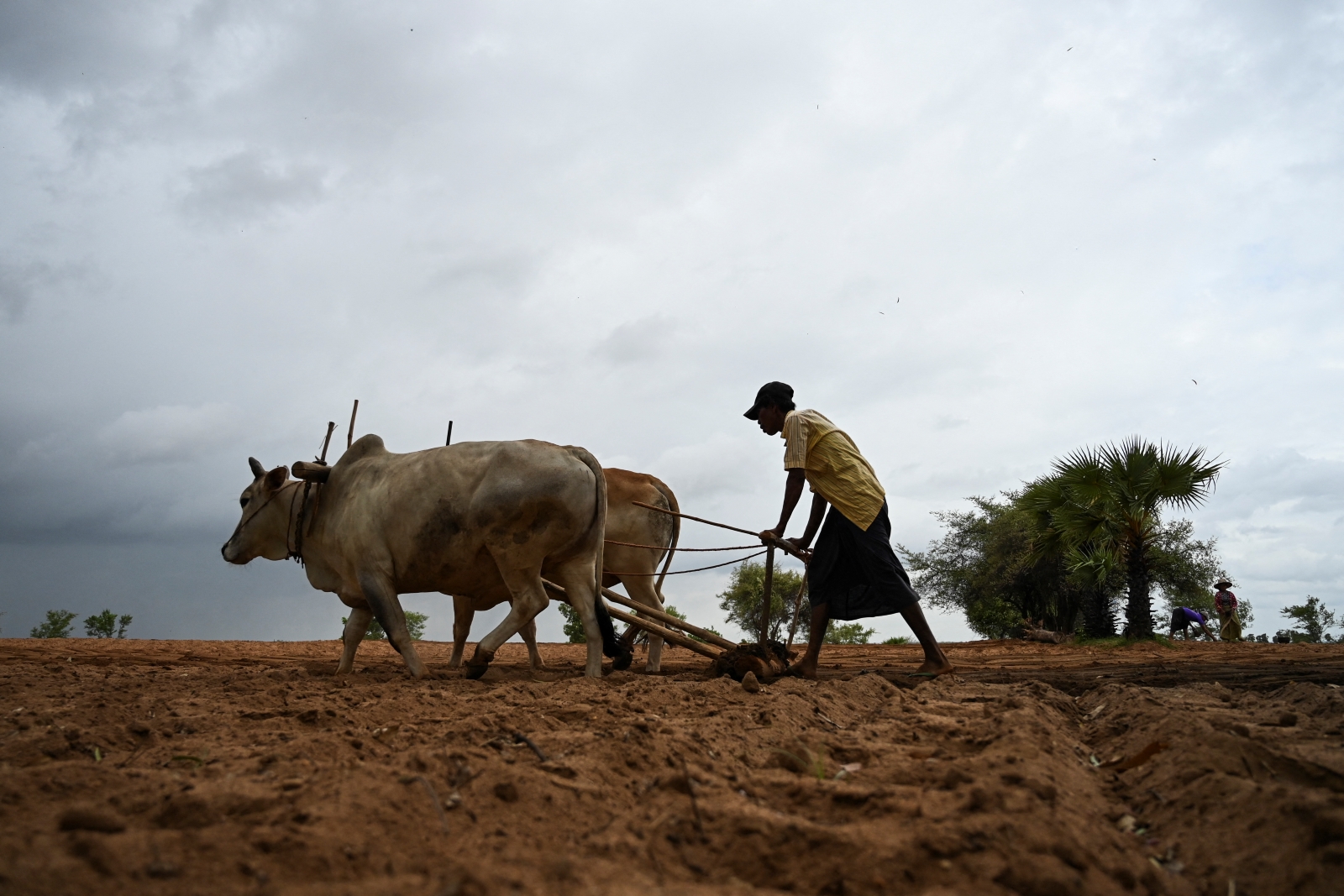Rising demand, border closures and a depreciating kyat have sent prices of medicines soaring – and now pharmacies are closing as staff become infected with COVID-19.
By FRONTIER
With more than 600 wholesalers, the eight-storey Shwe Pyae Sone Market in Yangon’s Mingalar Taung Nyunt Township is the biggest market in Myanmar for pharmaceuticals. Instead of the glass counters found in retail outlets, the small wholesale stores are stacked high with boxed-up medicines.
On July 4, the market was particularly crowded with customers, but they were flocking to particular stores: those selling cold and flu remedies, vitamins and personal protective equipment, particularly face masks.
“It’s been like this since July 1,” said one store owner, who asked not to be named. “Everyone is afraid of COVID-19, so they’re stocking up on whatever they think they’ll need.”
COVID-19 infections and fatalities are at a record high, topping 7,000 new cases on July 14 – more than three times the peak of Myanmar’s second wave. But inadequate testing – one in three tests is coming back positive – means the real number of cases is likely to be many times higher.
But for many the third wave is being exacerbated by rising prices for pharmaceuticals and a shortage of medicines and other essentials, including face masks and oxygen.
“In one or two months, the wholesale markets may run out of commonly used medicines if the infection rate remains high,” another wholesaler at Shwe Pyae Sone Market told Frontier.
The junta’s Ministry of Health and Sports announced the start of the third wave on May 25 and infections have soared since then, partly due to the presence of the highly transmissible Delta variant of COVID-19, which produces more severe symptoms and is more resistant to vaccines than other strains of the coronavirus.
On May 25, Myanmar recorded just 34 new cases. By July 14, the daily tally stood at 7,082, with a seven-day average of 4,633 cases a day. Deaths have also climbed rapidly, from 14 on June 30 to 145 two weeks later.
With demand soaring for face masks and pharmaceutical products, prices have also started rising at wholesale markets throughout the country.
“Face mask prices are beyond the reach of everyday people, and the prices of some commonly-used medicines for colds and flu have also risen,” said U Kyaw Htet, 37, from Yangon’s East Dagon Township.
“Authorities should control this situation,” he said, urging authorities to take action against wholesalers and retailers who are exploiting the situation by price gouging.
Everything is more expensive
But meeting demand could soon prove a challenge. The Myanmar Chamber of Commerce for Pharmaceuticals and Medical Devices says the country imports 90 percent of its medicine and related product needs. More than 40pc of imports are from neighboring India, which is experiencing its own deadly COVID-19 wave.
Some countries have, understandably, prioritised domestic needs and restricted exports of medical products, which has fuelled concern in Myanmar about shortages and resulted in some stockpiling.
In addition, the spread of COVID-19 from Shan State into the Chinese border town of Ruili prompted Chinese authorities on July 8 to shut all trade gates with Myanmar, putting at risks billions of dollars in bilateral business
The regime-controlled Ministry of Investment and Foreign Economic Relations has tried to ease the demand for medical supplies by relaxing rules around the importation of oxygen concentrators, including no longer requiring approval from the Food and Drug Administration to import. However, supplies remain limited, due in part to border closures aimed at preventing the spread of COVID-19.
Frontier spoke to 15 pharmacists at Yangon, Mandalay and Pyin Oo Lwin and six wholesalers at the Shwe Pyae Sone and New Bogyoke markets in Yangon and all predicted that medicine prices would continue to rise as the COVID-19 third wave wreaks havoc throughout the country.
“There may be shortages if medication cannot be imported,” said a pharmacist, who asked not to be identified.
Pharmacists and wholesalers say wholesale prices have risen for products ranging from common treatments for colds and influenza, to medicines that strengthen the immune system, and supplements, such as vitamin pills.
“Prices are rising for medicines that have long been popular, as well as those advertised on TV that people can take without a doctor’s appointment,” said U Tun Tun, who has a wholesale pharmacy at the Shwe Pyae Sone Market.
He attributed the higher prices to some foreign pharmaceutical companies halting production due to COVID-19 outbreaks in other countries, the difficulty arranging imports through borders that are constantly closing and reopening, and the slump in the value of the kyat against the US dollar.
Pharmacies in Yangon, Mandalay and Pyin Oo Lwin told Frontier that wholesale prices for vitamin pills have risen by more than 20pc, the cost of common treatments for colds, flu and pain relief has risen by about 25pc, and products said to strengthen immune systems are up by more than 50pc.
“Almost all COVID-19-related medicines are more expensive in the wholesale market,” said Ko Aung Aung Oo, who has a pharmacy in Yangon’s South Dagon Township.
He said that if pharmaceutical companies are unable to import more stock, pharmacies at wholesale markets will have no option but to raise prices.
Oxygen shortages
One of the key shortages during the third wave is supplemental oxygen, which is administered to about 20 percent of all COVID-19 patients. Hospitals are at capacity and turning away all but the most severe cases, leaving many people with sick family members scrambling to get oxygen from private suppliers and charity groups.
The price of a 10-litre oxygen concentrator has risen from K1.5 million to K2 million in some markets, while 40-litre oxygen cylinders can cost up to K450,000 now. Meanwhile, oxymeters – portable devices that measure oxygen saturation – have more than doubled in price, from K9,000 to K19,000.
“Most pharmacies have run out of both oxymeters and oxygen concentrators. We have to order them from abroad because there is a shortage in the market,” a wholesaler from one of pharmacies in Tarmwe Township said.
The junta’s Ministry of Commerce warned on July 5 that action would be taken under the Important Goods and Services Act against overcharging for pharmaceuticals or food products or stockpiling for the purposes of profiteering.
Offenders face a maximum penalty of three years’ imprisonment and a fine of K500,000 under section 4 of the Act. This has not stopped the surging prices of medical supplies, especially oxygen in recent days.
“We began inspecting markets in Yangon from July 5. We make wholesalers and retailers aware that they will be prosecuted under this law if they sell at exorbitant prices,” said a high-level ministry official in Yangon, who requested anonymity.
Ko Kyaw Myint Win, who has a pharmacy in Pyin Oo Lwin, said most wholesalers buy and stock up on top-selling pharmaceuticals and medical products with plans to release them when there are shortages.
“That’s why the price of medicines is going up,” he said.

‘A roaring trade’
But the price increases extend beyond oxygen equipment and cold and flu remedies, with the cost of medicines for chronic diseases also on the rise. The pharmacies at Yangon, Mandalay and Pyin Oo Lwin told Frontier that treatments for diabetes, hypertension, cancer, kidney disease and cardiovascular ailments now cost anywhere from 6.5pc to 20pc more than they did just a few months ago.
Daw Thuzar Win, 54, who has diabetes and lives in Yangon city’s Tarmwe Township, said the political situation and the rise in COVID-19 infections had resulted in higher prices for the medicine she needs. Anticipating further increases, she said she had bought two months’ supply in advance.
Wholesalers and retailers told Frontier that the prices of the most common traditional medicine products for colds, diabetes, nerve complaints and skin diseases have also risen since the third COVID-19 wave began.
Traditional medicine products have long been popular in Myanmar, especially in rural areas where Western medicine can be hard to buy, and are used by nearly 75pc of the population, according to the World Health Organization.
A traditional medicine wholesaler at Shwe Pyae Sone Market said manufacturers were raising prices due to rising costs for raw materials, wages, and packaging.
The wholesaler, who only sells traditional medicine and has more than 1,000 products in her shop, said that since the coup she had received more than 300 letters from manufacturers notifying her of price increases.
For example, the price of a pack of Taw Gyi Pan Khar, used by many to treat diabetes, has risen from K8,000 to K11,000.
“Myanmar traditional medicine is doing a roaring trade despite the price rises,” said U Tin Oo, who has a pharmacy in Yangon Region’s Thaketa Township.
Face mask prices have also soared since a June 15 Ministry of Health and Sports announcement that COVID-19 variants had been detected in five cities throughout the country.
The price of a box of 50 face masks in Yangon, Mandalay and Pyin Oo Lwin immediately jumped from K900 to K3,000.
“The most widely distributed masks in the market are imported from China and India. The current border closure has pushed up prices,” said a wholesale pharmacist at Shwe Pyae Sone Market in Yangon.
After COVID-19 was first detected in Myanmar early last year, the price of face masks rose as high as K30,000 for a pack of 50 masks in Yangon, said wholesalers, before eventually stabilizing around K900 before this most recent wave of infections.
Pharmacies shut down
But in recent days this trade has ground to a halt, with many retail pharmacies forced to close across Yangon. Although there have been rumours the junta ordered them to shut, pharmacy owners said it was because staff were getting infected with COVID-19.
“Some are also closing because they are afraid of getting infected,” said U Tin Oo, owner of Win Myittar pharmacy in Thaketa Township. “It’s nothing to do with the junta’s administrative council.”
Most pharmacies have also run out of popular medicines, such as paracetamol brand Biogesic, the flu medication Decolgen, and well-known vitamin brands such as Vitamin, Zinc 3, Enervon-C and Becozinc. Brands bird’s nest and Imunactiv, which is said to boost the immune system, are also in short supply.
“There’s now a lot of demand for popular products on Facebook but in the retail shops there’s a shortage,” Tin Oo said.
Wholesalers in Shwe Pyae Sone Market have also been affected. While the number of customers remains high, about half of the 600 stores have closed, either because the owners are infected or are afraid of catching the virus.
For popular medicines, pharmaceutical companies are limiting the amount of stock they sell to wholesalers. “Those medicines are very hard to find in the market,” said one wholesaler. “And if you can find them, the price is so high.”







